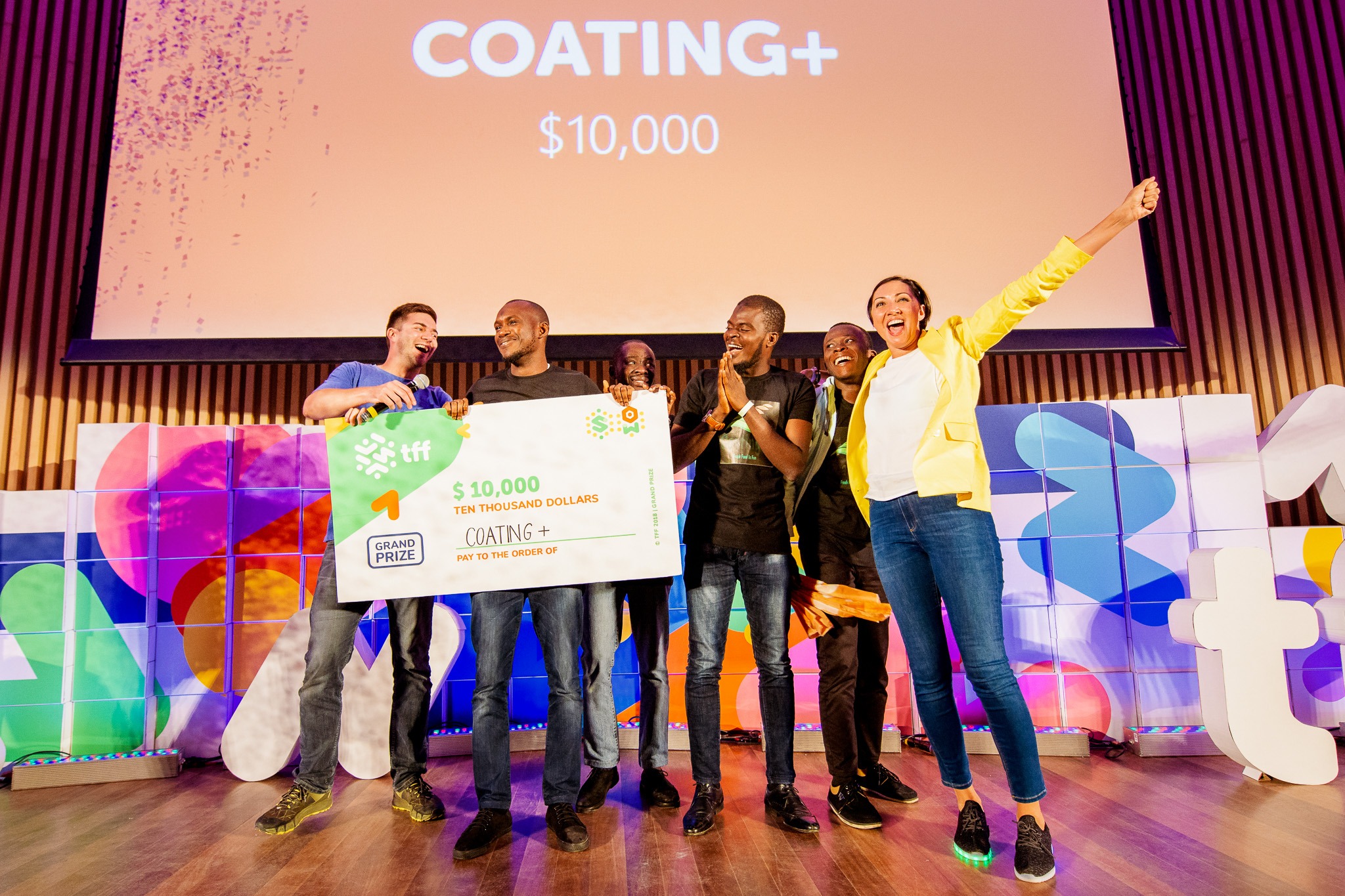When Albert Kure pitched his company on stage at the Museum of Tomorrow in Rio de Janeiro, he knew he needed to address what many investors would see as his competition.
Kure is president of Nigerian startup Coating+. The company makes an edible food protectant that extends the shelf life of fresh food using a compound found in shrimp shells, with supplemental vitamins and minerals added to help alleviate micronutrient deficiency in Africa.
Shrimp shells are plentiful in Nigeria due to its growing aquaculture industry, so including the compound chitosan, made from shrimp shells and already used in some pharmaceuticals and other agricultural applications, helps to put a dent in a major waste stream in Nigeria.
“We come form the perspective of using one problem to solve another,” Kure told AgFunderNews just after his winning pitch at the Thought for Food Summit in Rio. Thought For Food (TFF) is a non-profit competition and an acceleration program designed to discover promising new ideas for feeding the growing global population in a more sustainable way. Coating+ won the grand prize, which came with $10,000.
In Nigeria Coating+ is an entirely new idea, but for investors and western foodtech enthusiasts, the Coating+ concept conjures thoughts of two venture-backed Western startups: Apeel Sciences and Cambridge Crops.
Apeel, which has created a food coating from a plant-based fatty acid compound, recently raised a $70 million Series C round and Cambridge Crops, which makes a coating from silk, has raised seed funding from the Food-X accelerator and SOSV.
In his pitch, Kure acknowledged that these companies exist, but posited that if they don’t plan to come to Africa, they’re not competition.
“Africa is not even on their radar at all,” said Kure.
On top of starting with the Nigerian market and using different raw materials, another major differentiator is Coating+’s go-to-market strategy. Kure explained that in Africa, much of the financial burden of food waste and spoilage falls to the farmer, not the processor or retailer. So the company is planning on marketing the product to farmers with the idea of applying the coating soon after harvest.
Furthermore, Coating+ is focusing on products that are eaten whole and not peeled so that consumers can reap the benefit of the added nutrition whereas Apeel’s first commercial application is avocados.
African Startups for African Problems
Thought for Food founder and CEO Christine Gould said that since her competition looks for both impact and commercial viability, the finalists in the TFF Challenge offer much more geographic variety than other food and agtech competitions.
“There’s a bias in the world that [African startups] have to overcome … I was excited to show that science can come out of place like Nigeria,” said Gould. But she is still wary of duplicative ideas.
Another African startup pitching at TFF with a local solution was Kenya’s Safi Organics. The company uses a proprietary process to convert agricultural waste like coffee husk and corn cob into nutrient-rich biochar fertilizer.
“In Africa farmers are paying two to three times the global market price for fertilizer and we are scared that it will increase to 5 times before 2050,” explained operations manager Joyce Simon. “Safi is an organization that empowers smallholder farmers in rural areas and we do that by downsizing and decentralizing fertilizer production,” she said.
Safi Organics’ western counterpart is Cool Planet, a biochar startup which has raised more than $200 million, though it started out as a biofuels startup and pivoted around 2015. But, Safi doesn’t need millions to scale up a franchise model for its biochar production process – said that $500,00 could fund the company through its first few franchisees for at least the next year. Since logistics is a major factor driving the cost of ag inputs for African farmers, Safi’s distributed local model means that western competitors would have trouble matching Safi on price.
“We sell at half price for the same quantity. The effectiveness is better because it restores degraded soils. Our fertilizer is organic and increases their yields up to 30% and also save water,” said Simon.
The company has a pilot site in central Kenya built with technology validated by MIT.
Also demonstrating that agrifood tech trends are global was TFF finalist Likabs — a Ghanian startup looking to teach farmers how to farm snails. The company will then buy, process, package and sell the snail products in a scheme that seems to participate with the insect farming trend (though snails are technically gastropods).
Snails are a popular but largely unaffordable luxury in West Africa due to their seasonal nature along with increased agriculture inputs encroaching on the forests where snails like to reside.
“At first when you go to the forest you would see a lot of snails, but because of our farming practices where we use a lot of chemicals it is pushing them away, so we had the idea to bring the snails home to our farms,” said Rachel Dwamena Ghanson, cofounder and chief information officer at Likabs.
In the future, they hope to sell ground snail shells as pharmaceutical ingredients and additions to animal feed. Plus the team said that even snail slime has valuable nutrition. and could be salable.
“Me too” startups are plentiful in any tech space and agrifood tech is no exception, but in some developing markets, startups like Coating+, Safi Organics, and Likabs are banking on the idea that building a company tailor-made for the local environment will lead to rapid technology adoption where large international companies often fail to reach.
“It’s better coming from someone who understands the problem and who can relate to it. As Africans we grew up wth these things as problems. The shrimp waste is a problem. But its amazing that you can find a way to repurpose that problem and use it to solve so many things,” said Kure.





